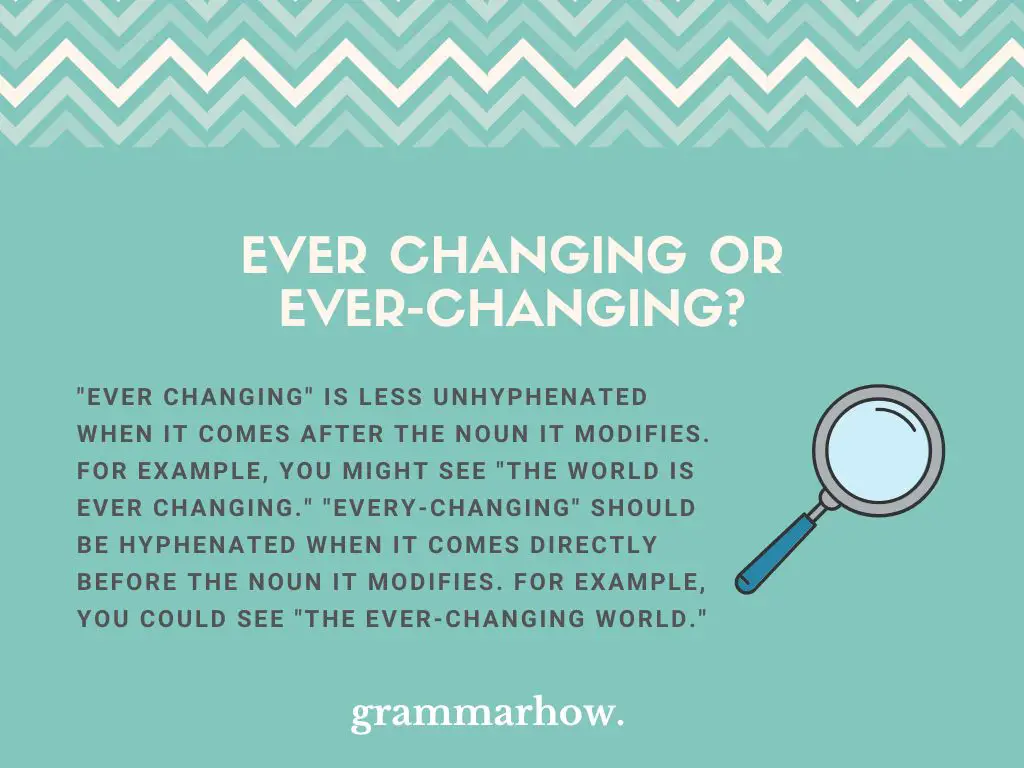Have you ever wondered whether “ever-changing” is hyphenated? It seems to be quite common in this form, though there are some cases where “ever changing” might work better. This article will explore whether it’s hyphenated or written as two words.
Ever Changing or Ever-Changing?
“Ever changing” is less unhyphenated when it comes after the noun it modifies. For example, you might see “the world is ever changing.” “Every-changing” should be hyphenated when it comes directly before the noun it modifies. For example, you could see “the ever-changing world.”

These hyphen rules are prevalent in English. You can refer to the AP Stylebook to learn more about them.
According to AP Style, you should hyphenate more than one word when it modifies the same noun. Typically, the noun comes straight after the compound adjective when it is hyphenated:
- The ever-changing tides of war.
On the flip side, you do not have to include hyphens when the noun comes before the compound adjective. AP Style suggests leaving the hyphens out to make it easier for the reader to follow along:
- This industry is ever changing.
Ever Changing
“Ever changing” is grammatically correct. You should use it as a compound adjective to modify a noun already established in the sentence. As long as the noun comes first, “ever changing” can remain unhyphenated.
Some writers would argue that “ever-changing” still works best when hyphenated, even if the noun comes first. Most style guides agree, allowing you to choose whether “ever changing” or “ever-changing” works best when the noun comes first.
- The world is ever changing. You have to know that things will never be the same.
- I think it’s best to keep it ever changing. I know it’s not ideal, but it’s nice to see how dynamic it can get.
Technically, the following sentence is also correct with a hyphen:
- The world is ever-changing, Scott. Don’t you agree?
This is a style choice. Once you choose one style, you must stick to it throughout your writing.
Ever-Changing
“Ever-changing” is grammatically correct when the noun comes directly after the compound adjective. The hyphen is used as a linker, allowing you to link “ever” and “changing” to show a common modification in the following noun.
AP Style teaches us that hyphens can link any number of adjectives when they modify the same noun. Without hyphens, the meaning of the word can be a bit confusing:
- Ever changing world.
Here, “changing” is the only adjective modifying “world.” “Ever” is not included in the modification, making it confusing to the reader what you mean.
That’s why it’s best to include hyphens between every word that modifies the noun (“world” in the case of the example above).
- The ever-changing world is very important to me. I start to tremble in fear, thinking about its vastness.
- You work in an ever-changing industry. Of course, people will make you do things you don’t want to do.
Ever-Changing or Ever-changing?
“Ever-changing” can be capitalized in different ways when it appears in titles.
In most title styles, you should capitalize both “Ever” and “Changing” when used as a compound adjective.
The only style guide that doesn’t promote this is AP Style. According to The AP Stylebook, you should keep the second word in the hyphen lowercase (so “Ever-changing”) when it’s included in a title. This is because the hyphen treats them as one word.
When using “ever changing” without the hyphen, it’s best to write it as “Ever Changing.” They are separate words, so you need to capitalize them both.
Conclusion
“Ever changing” and “ever-changing” are both grammatically correct.
AP Style teaches us that “ever-changing” applies when it comes before a noun and “ever changing” applies when it comes after the noun.

Martin holds a Master’s degree in Finance and International Business. He has six years of experience in professional communication with clients, executives, and colleagues. Furthermore, he has teaching experience from Aarhus University. Martin has been featured as an expert in communication and teaching on Forbes and Shopify. Read more about Martin here.
